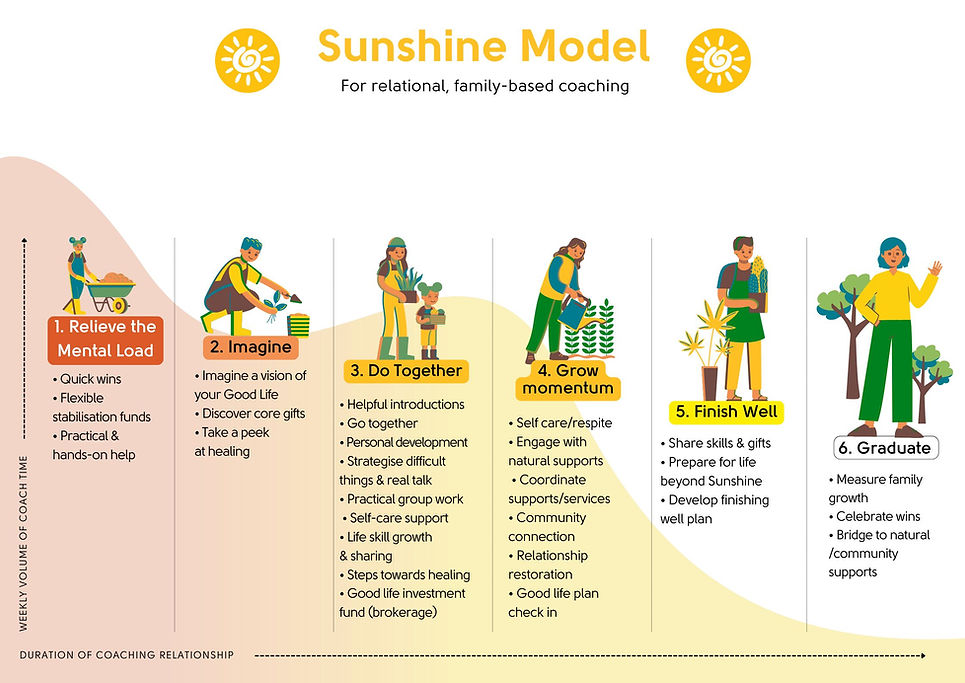The Sunshine Model
Research tells us that relationships are central to everyone’s capacity to navigate hard times and grow the good life.
The Sunshine approach is centred in fostering relationships within family units
whilst connecting families with relationships and resources from the
wider community to elevate their good life.
What is a good life?
The ‘good life’ is a family’s vision for their ideal state of being. It is intentionally non-prescriptive and creates space for families to articulate this on their own terms rather than based on a service provider prescribed set of options.
We have found that families' visions for a good life centre around four key themes:
-
Ability to meet basic needs
-
Access to healing or therapeutic services
-
Creating and strengthening connections
-
A sense of purpose and ability to contribute something in the world.
Starting with the Good Life as the focal point has been well received by everyone who has encountered it. It has provided a hopeful vision anchored in the deepest parts of each participant.
It doesn't aim for completion. It aims for health over time, which adapts to changing circumstances. All other aspects of Sunshine connect back to this premise of The Good Life.
Principles
There are five key principles that guide and inspire the Sunshine model.
Centre the Families and
De-centre the System
We start with the whole family unit and their priorities, with a focus on making sure they have a good experience of help. Families decide how, when and where
they will engage in Sunshine while
working on things that matter to them.
Connect with Resources, Relationships and Opportunities
We connect families with resources and opportunities to nurture their relationships, find new community connections and give back to others.
Work with Motivational Capital and Hope
We foster hope, working on things families have motivation to act on, using creative approaches to support these and small
wins to build motivational capital to
attempt bigger leaps toward the good life.
Grow the Good Life
The good life is not a point of arrival.
It is always changing. We create enabling conditions for families and communities to grow their good life
on their terms.
Relieve the Mental Load
We take practical steps to reduce mental load and create breathing space.
This enables families to connect with
and progress toward their good life.
The Sunshine Model
The Sunshine model features two key functions.
-
Relational Coaching - Support from a dedicated Sunshine Coach, who works intensively with a small cohort of families, providing a suite of generalist supports, drawing in specialist support as needed.
-
Community Building – Working in the community context to leverage and grow the place-based assets and opportunities available to families.

Sunshine Coaching
Sunshine Coaching is a relational, family-based model with a central focus of growing the good life. Coaching teams are empowered to centre and build trusting relationships with families as a mechanism to understand and enable the conditions for each family’s good life. Along the way they support each family to nurture their existing relationships and discover new community connections.
The coaching model follows six phases of coaching, typically over a 12- 18 month period depending on family's need. For Sunshine, family means everyone who lives in a household as they progress through the coaching journey.

Sunshine Community Building
Sunshine community building involves convening Sunshine families, local services, grass roots volunteer groups and interested community members to tackle local opportunities that families identify in their vision for a good life. The Community Builder creates opportunities for families to access resources, experiences, new connections and make genuine contribution as community members.
